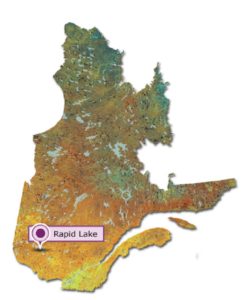Barrière Lake Algonquin triumph over Copper One Inc.

By Brett Forester
RAPID LAKE—The Algonquins of Barrière Lake (ABL), a small Anishinabek community of well under 1,000 citizens have won a tenuous victory over Copper One’s plan to mine traditional Algonquin territory.
Copper One is a Toronto-based mineral exploration start-up company with one proposed project: Rivière Doré. The Rivière Doré property covers 600 kilometres between the Québec towns of Val d’Or and Mont Laurier. The company surveyed the site in 2010 and 2011. They were scheduled to begin drilling in 2016, with more extensive drilling penciled in for 2017.
Then they ran into the aptly named Barrière Lake.
The Barrière Lake Algonquin territory is three hours north of Ottawa, directly between Val d’Or and Mont Laurier. Their traditional territory, they say, comprises a large swath of La Réserve faunique La Vérendrye, a Québec nature preserve.
“Absolutely none of our applications for drilling 14 locations are within this area,” said Scott Moore, Copper One President and CEO.
ABL leaders contest this claim, and have a reputation for resistance.
In 2012, the ABL blockaded corporate logging on traditional lands. They protested Health Canada’s federal headquarters, demanding that the government honour a 1997 Memorandum of Mutual Intent on community infrastructure development. They sued the Canadian government over mismanagement of band funds.
On March 23, 2017, the ABL held a press conference on Parliament Hill demanding an end to third party management of First Nations funds. ABL Chief Case Ratt says that financial management firm Lemieux Nolet takes as much as 10 percent of band monies. The Globe and Mail reports that the company’s fee amounted to over 400,000 dollars for 2015-2016. Compare this with the 10 million dollars Canada claims to have invested in ABL through its Memorandum of Mutual Intent. This 10 million was invested over 20 years, from 1997 to 2017, amounting to 500,000 dollars per year.
Third party financial management is worth nearly as much to the government as building community infrastructure.
When ABL heard about Copper One’s plan, naturally, they acted. In the autumn of 2016, the ABL set up what they call a “land defense camp” along the outskirts of the Barrière Lake region. The camp acted as a barricade, physically prohibiting the continuance of mining incursions, and remained occupied throughout the winter.
“We are willing to make some accommodations for forestry and recreational activities,” wrote ABL Councillor Norman Matchewan in a French language article for Le Devoir. “But exploitative mining will not be tolerated.”
ABL leaders say that they have not consented to the project. The government issuance of resource extraction permits, they argue, violates a 1991 Trilateral Agreement on sustainable resource development signed between Canada, Québec, and the Algonquin. The Chrétien administration walked away from the deal in 2001, citing ‘escalating costs’ and ‘a lack of convincing results’ among its reasons. The ABL hope to finalize a functional deal with the Québec provincial government.
The Trilateral Agreement contains maps marking out spawning areas, hunting grounds, sensitize zones, and sacred areas. It includes a buffer zone between resource extraction and traditional use land. Community leaders oppose mining on any areas reserved under the agreement for traditional economic usages.
“Mining destroys everything,” warns Tony Wawatie, Interim Director General for the ABL.
“There is a lack of trust,” he continues, referring the government’s apparent inability to abide by the Agreement. “A real lack of trust.”
However, the Québec responded to the ABL mining barricade by revoking Copper One’s licence. Québec’s Ministère de l’Énergie et des Ressources naturelles (MERN) informed Copper One on January 27, 2017, of its decision to suspend all company claims around the Barrière Lake area. In a letter released by the company, MERN said ABL’s barricade gave MERN the power to revoke Copper One’s claim under Article 63 of the Québec Mining Act.
Article 63 gives the provincial minister power to revoke licences if “validity of the claim is contested” or “the claim holder is prevented from performing the work.”
The company called MERN’s choice “abusive” and “an excess of jurisdiction.” On February 27, 2017, Copper One filed a formal appeal against the decision.
The appeal is currently before the courts.
Nevertheless, as it stands, the Barrière Lake Algonquin have won a small victory in a very big fight.


